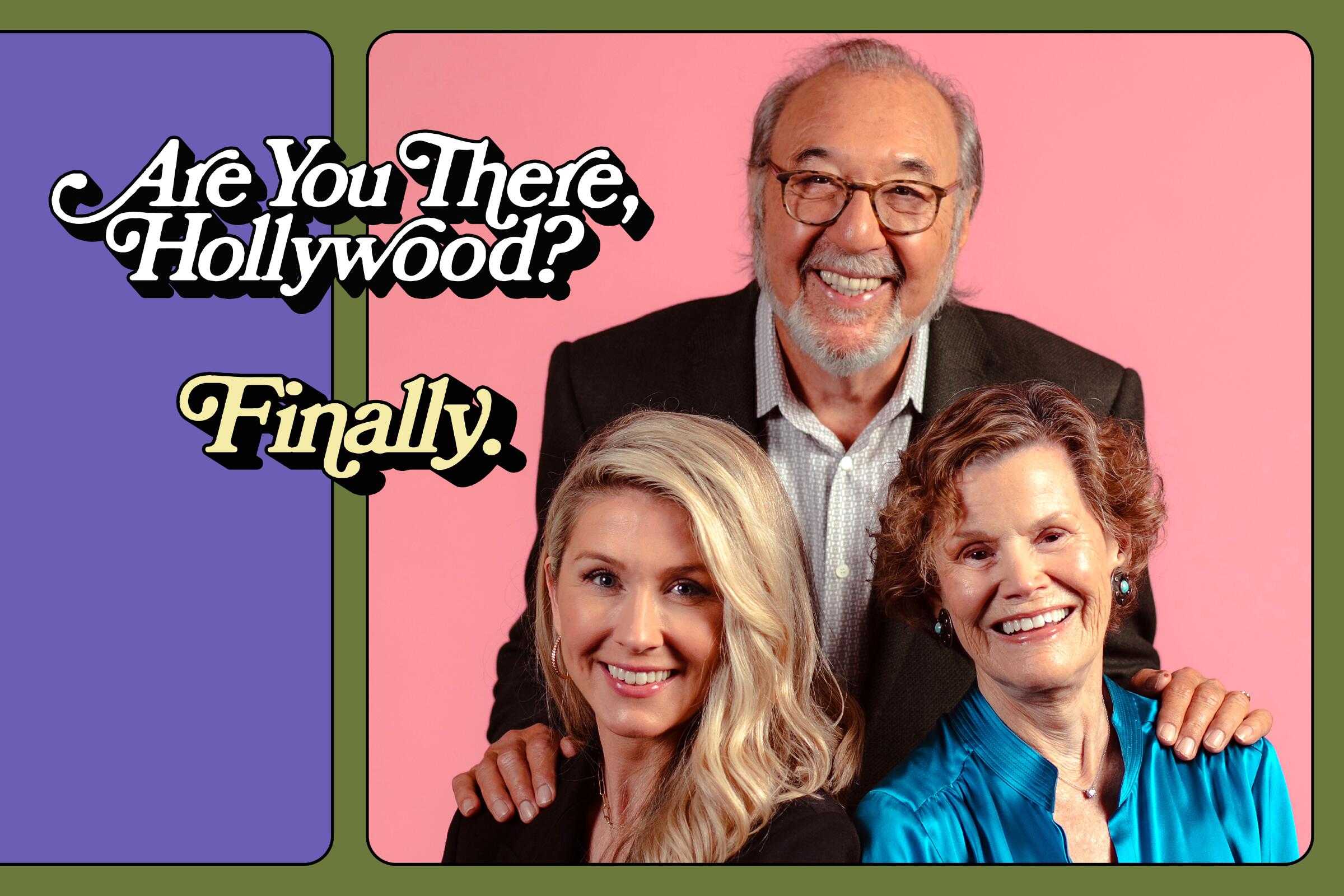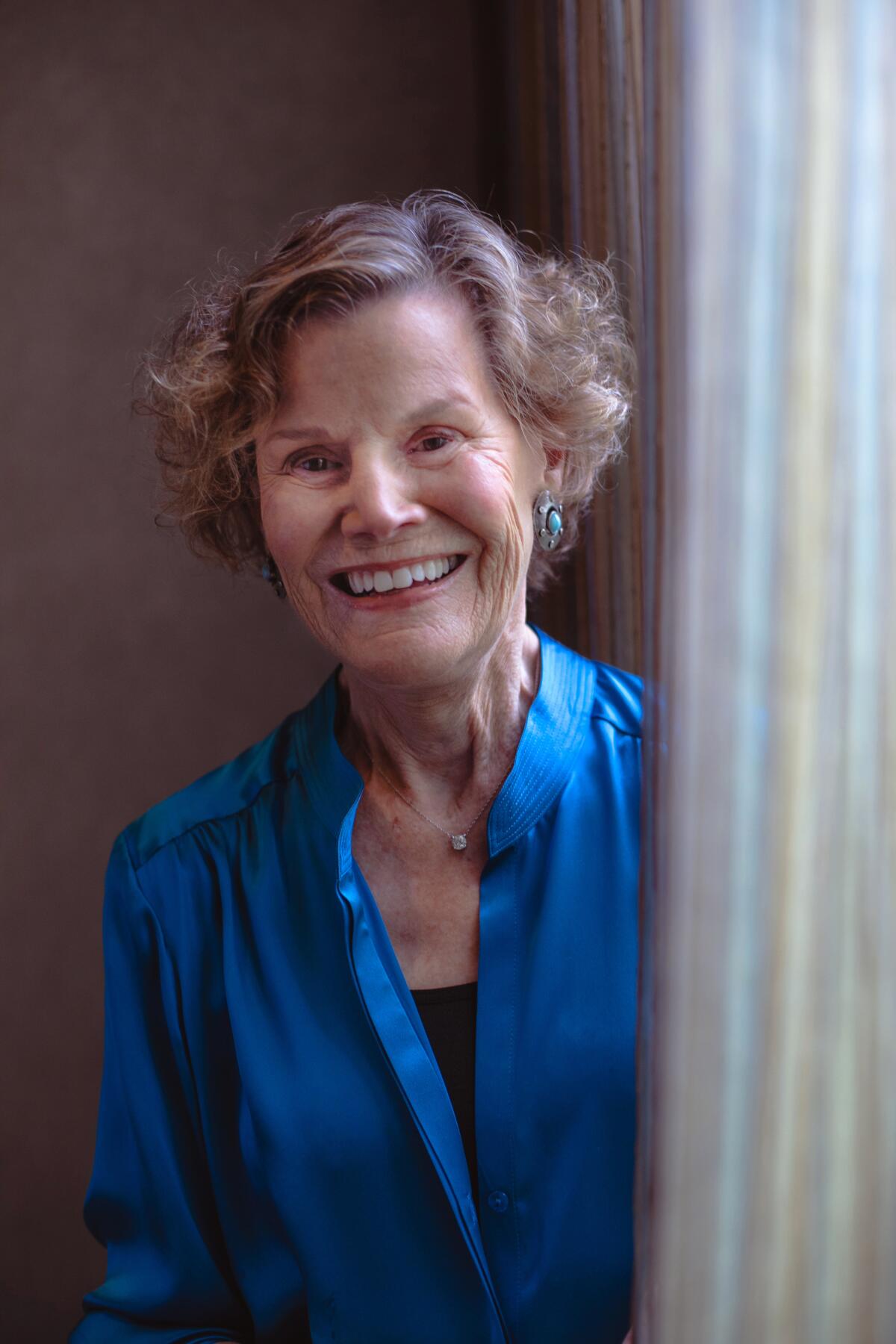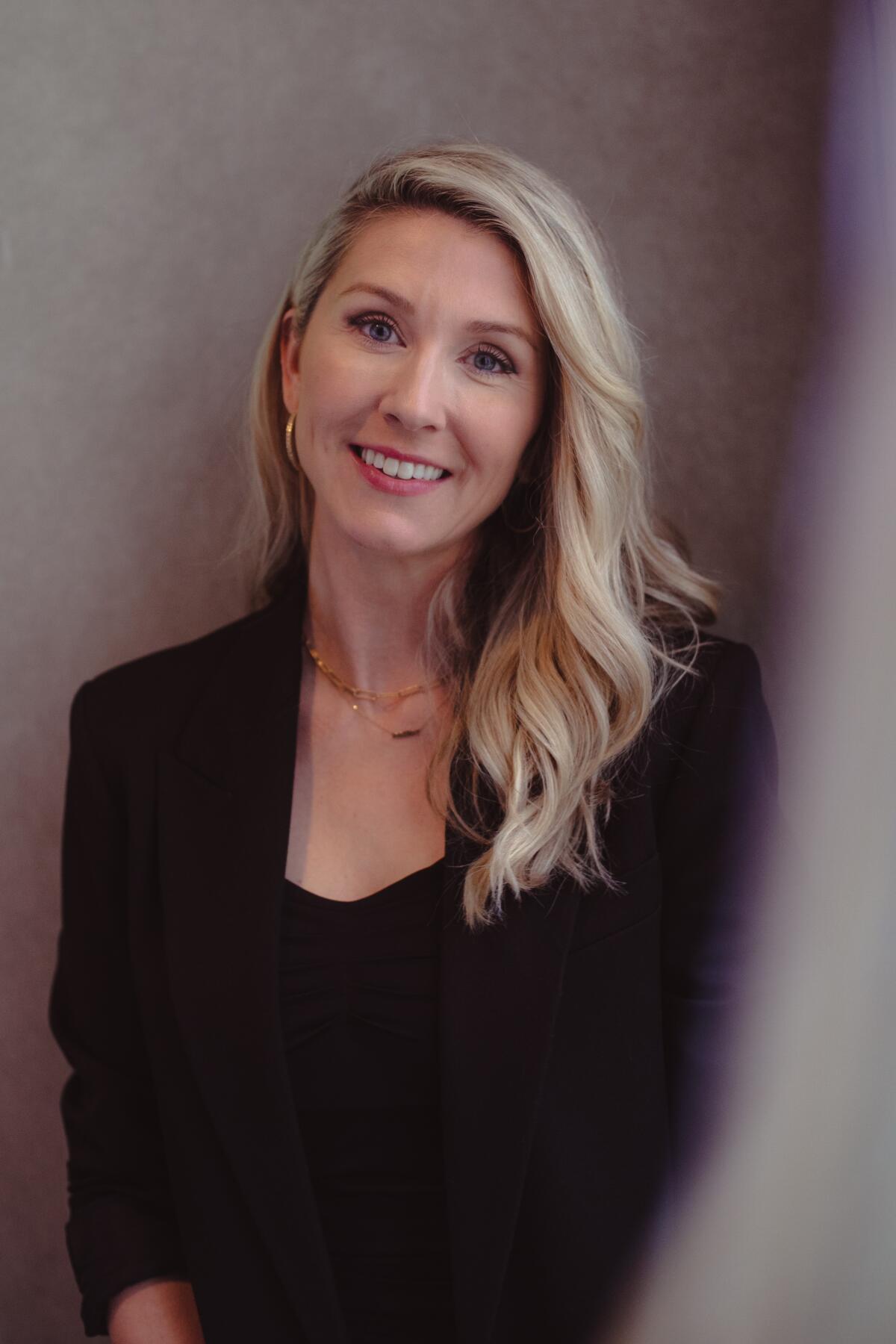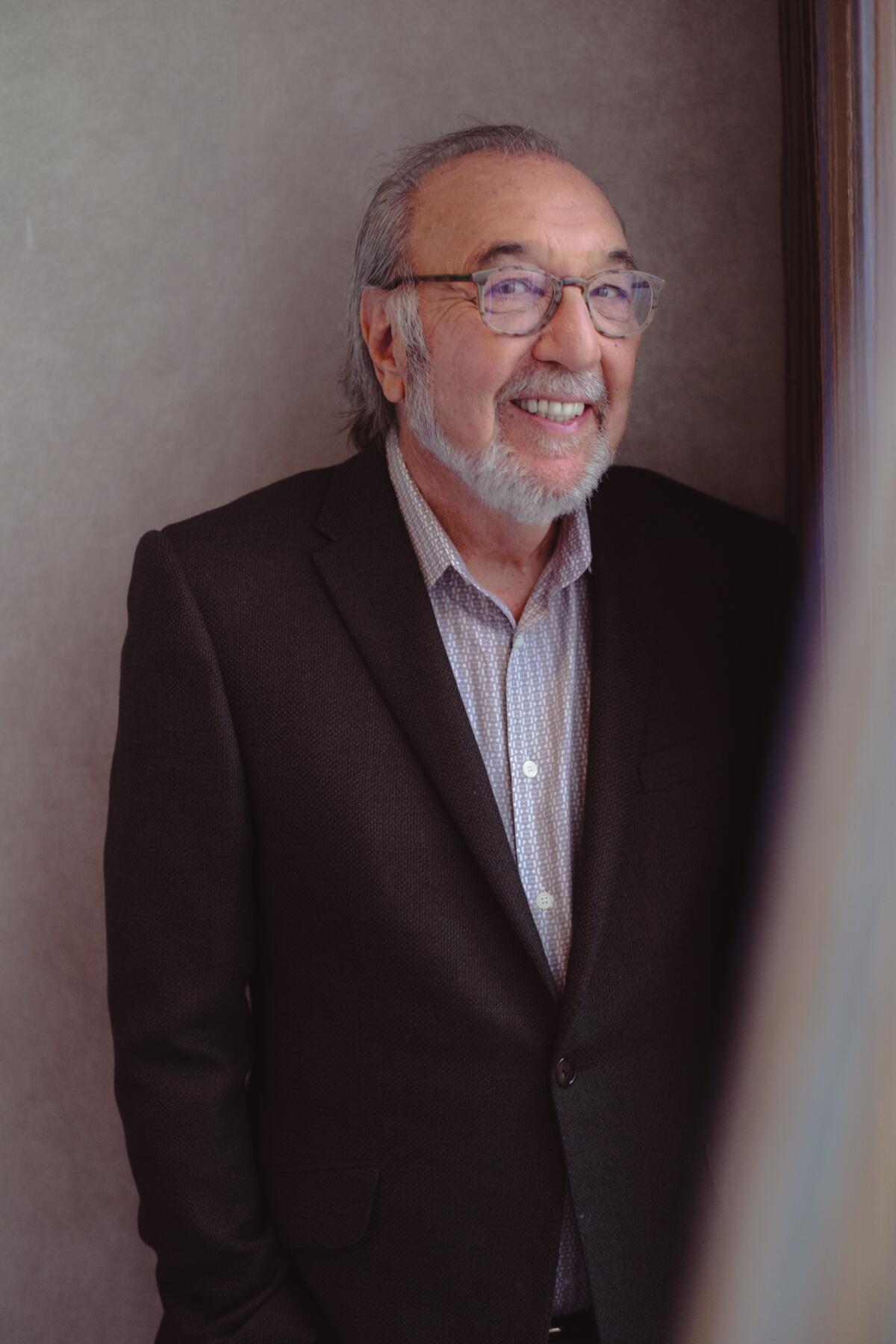Sign up for our Book Club newsletter
Get the latest news, events and more from the Los Angeles Times Book Club, and help us get L.A. reading and talking.
You may occasionally receive promotional content from the Los Angeles Times.

Sanctioned, interrogated, smeared and threatened with violence: Is this a suspected terrorist, or perhaps a rogue politico? No, it’s beloved children’s author Judy Blume. She’s comforted generations of young people by voicing their worries, answering their letters and fighting for their freedom to read about the stuff of their daily lives: puberty, bullying, family dynamics, early searches for faith and love. It’s been a long fight. This weekend sees the premiere of “Are You There God? It’s Me, Margaret,” the first-ever adaptation of Blume’s 1970 classic.
Still both candid and nurturing, unruffled by global success, Blume, 85, is retired from writing and runs a bookstore with her husband, George Cooper, in Key West. A new documentary, “Judy Blume Forever,” surveys her life and career, covering her fervent fanbase, Reagan-era censorship and the outrage at Blume’s plain discussion of adolescent concerns. Today Blume is using her platform to fight the present wave of book bans, which is targeting kids’ books dealing with gender and race.
It’s a battle both starkly similar and sharply different from those of the past, but Blume is navigating its minefields with remarkable agility. In a story in the U.K.’s Times earlier this month, a journalist couched a quote from Blume to imply that she shared author J.K. Rowling’s opposition to transgender rights. In fact, Blume had only expressed sympathy with authors harassed online — an experience she knows something about. She quickly spoke out, reiterating her well-known support for all LGBTQ rights and calling any suggestion to the contrary “bull—.”
The author is newly in the public eye because her work is suddenly everywhere. Several scripts based on Blume’s books are currently in development: an animated “Fudge” film to be produced by Joe and Anthony Russo (of “Avengers: Endgame”); a series inspired by “Forever…” from Mara Brock Akil (“Girlfriends”); and a version of “Summer Sisters” at Peacock.
The body-positive message of the new film version of “Are You There God? It’s Me, Margaret” is just as needed now as when the book came out 53 years ago.
Blume had long declined offers to option “Margaret,” aware that to many, the book is a sacred text. Her experience with adaptations had been mixed: a TV movie in the ’70s based on “Forever…,” a short-lived TV series in the ’90s based on her “Fudge” books and — happiest for her — a feature film of “Tiger Eyes” directed by her son in 2012.
But with a sense of her time growing short and a desire to see “Margaret” done right, Blume agreed to meet with director Kelly Fremon Craig (“The Edge of Seventeen”) and producer James L. Brooks (creator of “The Mary Tyler Moore Show” and “Taxi”; writer, director and producer of “Terms of Endearment” and “Broadcast News”; executive producer of “The Simpsons”). Impressed with their work and their pitch to her, Blume let them adapt her most cherished book — and couldn’t be more thrilled with the results.
Change is good, and interesting. It doesn’t mean there’s not room still for reality.
— Judy Blume on the boom in YA fantasy novels.
In the story, incoming sixth-grader Margaret Simon (Abby Ryder Fortson) moves from Manhattan to New Jersey with her parents (Rachel McAdams and Benny Safdie). Her classmates are obnoxious, her body is changing (but not fast enough) and she sorely misses her adoring grandma (Kathy Bates kills in the role). Her parents’ interfaith marriage caused estrangement from her mom’s folks, leading Margaret’s family to forgo religious practice. At 11, Margaret’s sense of gravity over preteen dramas leads her to consult a higher power.
Recently, The Times gathered Blume together with Brooks, 82, and Fremon Craig, 42, for a Zoom interview. They discussed their experience making the film, argued about the development process and questioned the true origins of a storied pectoral exercise. Their conversation has been edited for clarity and length.
Fifty-three years after the publication of Blume’s ‘Are You There God? It’s Me, Margaret,’ the fight to destigmatize menstruation continues in film and TV.
Judy and Jim, you two are contemporaries in your lives and careers. You both had your early breakthroughs, “Margaret” and “Mary Tyler Moore,” in 1970. Both works are known for breaking new ground with realistic stories about the everyday lives of women and girls. How aware were you of each other’s work back then?
Blume: I wasn’t following “who was this person doing this on TV” in those days; I think it was more that I knew his name from movies. Is that fair, Jim?
Brooks: Sure, I mean — you’ve never seen “The Mary Tyler Moore Show”?
Blume: Oh yes, of course, but I didn’t know about YOU!
Brooks: I was thinking you had a great binge in store! (laughs)
Blume: What a great show.

Jim, I’m guessing some of your children would have read Judy Blume?
Brooks: Yes, absolutely. And grandchildren!
I’m curious about how you two have seen storytelling evolve. Where do you see the echoes of the early work you made?
Blume: Jim?
Brooks: I think it’s yours! (laughs)
Blume: Kelly?
Fremon Craig: It’s a hard question for either of them to say, but I can tell you, I see the echoes everywhere. I think I’m one of the echoes! I’m trying to do what both of them did.
Blume: I can’t answer for Jim, but I didn’t know what I was doing, so it never occurred to me that I was starting some new “something,” and that people were going to follow it.
We’re going through a different phase now, fantasy and dystopia, and all kinds of things that are coming from somewhere else. Change is good, and interesting. It doesn’t mean there’s not room still for reality. But I think it’s cyclical with kids’ books.
It would be like updating the Bible!
— James L. Brooks on the need for “Margaret” the movie to stay in 1970.
The adaptation feels very much steeped in period nostalgia, and I wondered: Was there ever a time any of you thought about updating the story?
Fremon Craig: No. Not even for half a second. Never.
Blume: It was one of the things, when Kelly and Jim came to visit me, that I had to say to them. Because I wasn’t willing to do it if they tried.
Brooks: It would be like updating the Bible!
Blume: (Laughs) I don’t know about that! But I don’t think it would have worked, so I never would have done it that way. Fortunately, they both said, “Absolutely 1970, that’s it.”
This touching nonfiction film, featuring interviews with Blume and famous fans such as Lena Dunham and Molly Ringwald, offers a comprehensive look at the beloved author’s enduring popularity.
Brooks: It’s 1970, but timeless at the same time. I think everybody in every department had that mission. Ann Roth is the best costumer ever, she’s the GOAT of costuming, and I think that’s an enormously special part of it.
Blume: There’s one moment when the girls are sitting outside on the school steps, and Gretchen comes in and she says “I got it,” and they’re all like “What? What did you get?” One of them, I think it’s Margaret, is wearing EXACTLY the clothes my daughter wore to school in 1970.
Fremon Craig: Oh, my gosh!
Brooks: But this is vitally happening in the present for these kids in the movie, and I think it’s really important that that was nailed.
I thought the child actors in this film were terrific.

Fremon Craig: For most of them that was the first thing they’ve ever done. But there was something exciting about that, because very often it was just pushing them to be themselves, and to improvise.
The scene where they look at the anatomy book, and they look at the drawing of the penis for the first time, that is really the first time they saw it. And we just said, “React however you would react naturally.” And so everything they say is really just what they thought when they were looking at it. That’s not scripted, that’s just those kids in the moment!
While the film adaptation is largely faithful to the novel, Margaret’s mom gets her own storyline now. The family’s move to the suburbs is in part to let her stay home and focus on parenting, but she longs for a creative career. And I know that Judy, you had a similar experience as a homemaker in 1960s New Jersey. I’m curious, is the mom’s storyline in the film to reflect Judy’s experience? Or is it there to appeal to contemporary adult viewers, who might identify with sacrificing parts of themselves to raise kids?
Blume: It’s one of the ways I think the movie is better than the book. The book is internal, and if you’re a kid reading it, this is what you want to read about. You don’t want to read about your mother’s life. But when you’re watching a film, you need to know who Barbara Simon is. You never learn that in the book because it’s just Margaret’s point of view; she’s Mom. But she’s a real person, and Kelly made that happen.
I never thought of her as being me in any way, no. So it’s all a great surprise, then.
Fremon Craig: At the time, I was really trying to balance my own role as a mom against my role as a writer-director and someone who has a career I really love. So a lot of it is an exploration of some of those personal things that I think I probably projected onto Barb.
Judy Blume says her current book tour will be her last.
I’d like to talk a little more generally about adaptations. I know that these days it’s much easier to get a project greenlit with existing IP. Jim, you’ve probably seen this trend develop in the years since you made “Terms of Endearment.” And Judy, you’re riding the adaptation wave with several new movies and shows —
Blume: Not really! That’s not really true. “Fudge” has been placed for a long time, and I don’t know what’s going on with “Fudge.” “Forever” is not an adaptation; “Forever” is a reimagining. … And “Summer Sisters,” yeah, hopefully, but we’re not there yet.
Brooks: For truth’s sake, when Kelly and I started to make the rounds with the screenplay that’s the movie, there was a lot of rejection.
Fremon Craig: I don’t know, actually — or maybe I blocked it?
Brooks: Maybe I shielded you!
Fremon Craig: (Laughs) We went to a lot of places that wanted it, and then it narrowed down.
Brooks: (Laughing and shaking head) Either I had imagined rejections, or you had imagined acceptances!

Fremon Craig: There were actually a ton of places that wanted to do it, but we wanted to do it in a certain way —
Brooks: A ton of places?!
Fremon Craig: Yes! There were like 10 places that wanted to do it.
Brooks: (Grabs his head) Immediately after this you need to name those places that failed to interrupt my sweaty evenings!
Fremon Craig: We wanted to be able to make the movie the right way. We wanted to have enough money. We wanted to go theatrical, that was a big deal. There were several places that offered to stream it. So there were a lot of doors WE closed. We rejected THEM, Jim! (Laughing)
Blume: I remember it Kelly’s way! Maybe we’re just optimists. But I only know what you told me.
Brooks: Well, we would have spun it a little for you.
Blume: You didn’t tell me everything!
Kelly: When we went into Lionsgate, they had transformed the conference room into 1970 and went all out, because they were fighting against the competition. They knew they had stiff competition.
Great! Great! Judy, I know you sold your papers to Yale’s Beinecke Library, so you’re thinking about your legacy. And obviously there’s a lot of material that could still be developed for the screen. Do you have plans?
Blume: I love movies. I love them! And I would welcome the opportunity to do more. But this was once in a lifetime. Everything went right. For me — Jim, I don’t know about you! (Laughs)
Brooks: The experience of making this movie, I absolutely agree with you. The spirit was always there.
“Banned Books,” one of the most popular panels at the Festival of Books, featured Angie Thomas, George M. Johnson and some sharp students from Fairfax High.
Blume: From my bit of time with you all on the set, it was like nothing else I’ve ever seen. Kelly, you set it up to be warm and friendly, and safe for all your actors, and I really, really admire that. And Jim was there every second.
Fremon Craig: (To Blume) There was just such a shift in the spirit when you arrived, because everybody was just like (gasps) “She’s here!”
Brooks: Guardian angel.
Fremon Craig: Yeah! It did feel like our fairy godmother was there.
(Blume pumps a fist)
Blume: There was no day when I ever came home and didn’t smile. And I have been around movies of mine, series that were made long ago, where George said, “I’m not going to do this with you if you’re going to come home and cry every single day.” And I tried not to, but in that instance, I did come home and cry every single day. It was that frustrating and mean.
Brooks: That’s awful!
There was just such a shift in the spirit when she arrived, because everybody was just like (gasps) ‘She’s here!’
— Kelly Fremon Craig, of Blume’s presence on set.
Blume: My son taught me a lot, because I sat next to him every day on the set of “Tiger Eyes,” and I learned how to behave well, and not to say a lot to the director. I did, Kelly! I knew if I needed to get a message to you I could, but you don’t go running up there interrupting a scene.
Brooks: Unless they’re doing the wrong things about “We must increase our bust!” (Laughs)
Fremon Craig: (Laughs) And thank God!
Did you come up with the chant, Judy?
Blume: No! We were all doing it in the ’50s; I don’t know where it came from!
(We all laugh and imitate the move)
Judy, I know you’ve been outspoken about censorship over the years and about recent book bans. Do you have advice for people who are fighting bans in their communities?
Blume: Things are really rough right now, because it’s government and legislators. It’s not just a parent running in with a book, demanding its removal. I don’t think anyone should try to do it alone, but join forces with National Coalition Against Censorship; PEN America is doing a great job, American Library Assn., Freedom to Read.
I think the important thing is to do SOMETHING, to not just sit back and let this happen. It’s not an impossible task, although it may feel that way from time to time. We must speak out. We must. We must!
Johnson writes the Times’ Page to Screen column. Her work has appeared in the Guardian, the New York Times, Los Angeles Review of Books, the Believer and elsewhere.
Sign up for our Book Club newsletter
Get the latest news, events and more from the Los Angeles Times Book Club, and help us get L.A. reading and talking.
You may occasionally receive promotional content from the Los Angeles Times.